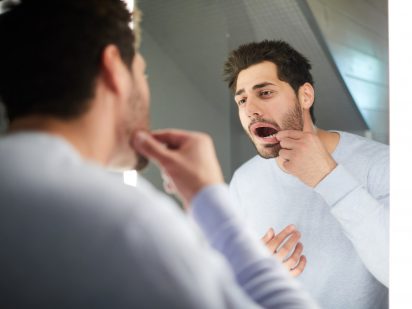The importance of oral self-examinations
When it comes to oral health, there is more than just teeth. There are other important structures, such as the tongue, cheeks, roof of the mouth, and gums.
Performing monthly oral self-examinations is important to your health, said Alexandra Radu, DMD, MD, an oral and maxillofacial surgeon with Trinity Health.
“The biggest concern here is to find potential cancer in its beginning forms,” she said, noting that self-examinations can help catch “changes in the oral region” so that pre-cancerous lesions can be found early enough before they become destructive.
According to the American Academy of Oral and Maxillofacial Surgeons, the steps to perform a self-exam include:
- Remove any dentures
- Look and feel inside the lips and the front of the gums
- Tilt head back to inspect and feel the roof of your mouth
- Pull the cheek out to see its inside surface as well as the back of the gums
- Pull out your tongue and look at all of its surfaces
- Feel for lumps or enlarged lymph nodes in both sides of the neck, including under the lower jaw
These examinations can help a person spot any abnormalities, such as sores, white patches (leukoplakia), red and white patches (erthroleukoplakia), or any kind of growths, Dr. Radu said.
White patches are the most common abnormalities a patient would usually see, so it should be noted that scar tissue (from biting your cheek, for example) can easily be mistaken for something more serious. “Most things in the mouth look white or red/pink in nature, but we’re concerned about something that is new, especially that is growing or changing in consistency,” Dr. Radu said. “Also, we are worried for those white patches that are located where there should not be any mechanical factors (such as a spot where the dentures or a sharp tooth are rubbing).”
While oral examinations are important for everyone – “Anyone can develop oropharyngeal cancer,” she said – those who are at increased risk should take note of the importance of performing these exams, Dr. Radu said. “It’s important for everyone to get familiar with their mouth so that they may spot anything out of the ordinary.”
Oral cavity cancer can be caused by tobacco and alcohol use, which are the strongest risk factors for this type of cancer, the American Cancer Society said. “Smokers are many times more likely than non-smokers to develop these cancers,” the Society said on their website. “Tobacco smoke from cigarettes, cigars, or pipes can cause cancers anywhere in the mouth or throat. It can also cause cancers of the larynx, lungs, esophagus, kidneys, bladder, and many other organs.” HPV is also a known contributor for oropharyngeal cancers, Dr. Radu added. For that, symptoms of long-lasting sore throat, unexplained earaches, hoarseness, or swollen lymph nodes are some of the more common concerning symptoms.
If a person does see something abnormal, a dentist or oral surgeon would be the best person to evaluate the symptom and determine if there is a need for further care, Dr. Radu said. An otolaryngologist, also known as an Ear, Nose, and Throat (ENT) doctor, can also diagnose and treat oral cavity and oropharyngeal cancer.
Trinity Health’s Oral Facial Surgery Center, the office for Alexandra Radu, DMD, MD, and Michael McMahon, DDS, is located at Health Center – Plaza 16. For more information or to schedule an appointment or consultation, call 701-857-2600.

